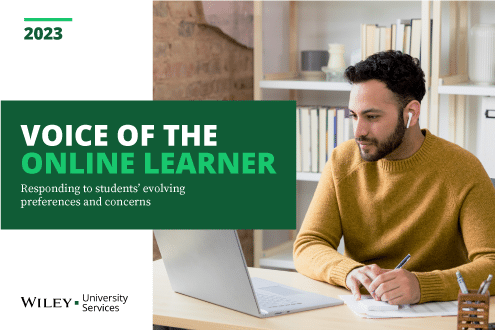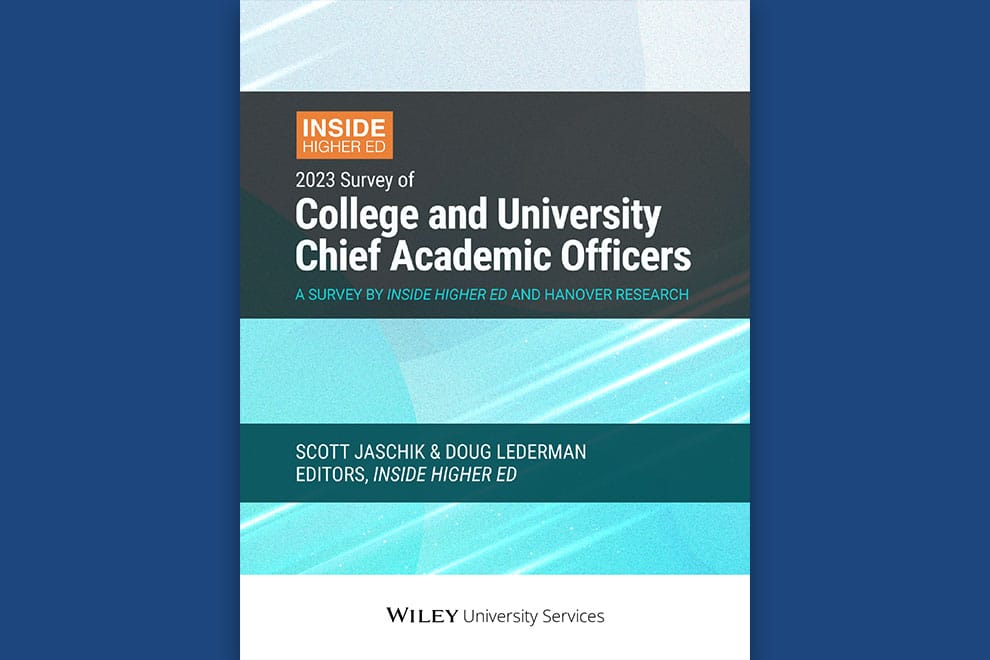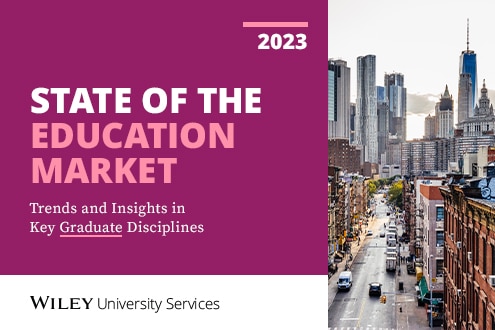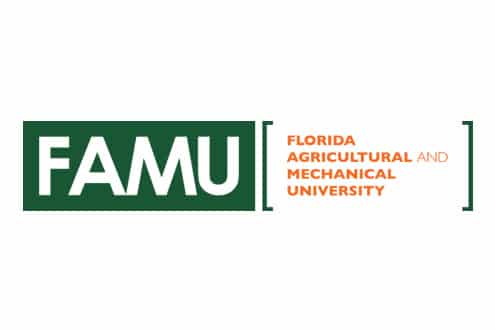Speaker 1:
You’re listening to An Educated Guest, a podcast that brings together great minds in higher ed to delve deeper into the innovations and trends guiding the future of education and careers, hosted by the President of Wiley University Services, Todd Zipper.
Todd Zipper:
Hello. This is Todd Zipper, and I am the host of An Educated Guest. Today I am here with Ryan Craig, Managing Director of Achieve Partners. Ryan is a prolific writer including being a senior contributor at Forbes, writes a regular blog called Gap Letter, and is the author of two books. The first is called College Disrupted, which focuses on how he sees the future of higher ed. The second is A New U: Faster + Cheaper Alternatives to College, which highlights boot camps, apprenticeships and more. The key takeaways from our discussion. First, the affordability crisis is not just about affordability, it’s employability as well.
Todd Zipper:
The combination of student loan debt and a lack of completion paired with underemployment is a warning sign that things aren’t working as they should be in higher ed. Second, operating from left to right within education worked when the labor market was stable. The shift in the labor market has shown that left to right no longer works. Good first jobs in the digital economy are out of reach for many. The answer is not free college or even the four-year degree in most cases. Third, the education system and the government doesn’t fund outcomes. It funds inputs and enrollments. We need to teach the things that employers are looking for in their first jobs. Funding innovative new models that are not education up, but employer down.
Todd Zipper:
Fourth, talent as a service. A new way to think about education delivery is a model that trains talent and places with employers, eliminates friction for the learner and employer creating faster and cheaper pathways to good first jobs. Lastly, immersive intensive practical experiences are still critical for many jobs. Paired with online learning can serve as an important pathway at scale. Ryan, thank you for being here today with me.
Ryan Craig:
Todd, it’s great to see you and hear you.
Todd Zipper:
We’re going to spend most of our time today talking about the crisis of affordability and employability within higher education, along with higher ed’s response to the pandemic and academic integrity, and probably a few other topics. We’ve got a lot of ground to cover. Let’s get started. It’s a well established norm that college costs too much for the value being created for students and society, and the big evidence often cited is the $1.7 trillion of student debt, which is rising. First, do you agree that I am framing affordability in the right way with this program, and this is a big problem?
Ryan Craig:
Yeah. Look, that was a chapter in my most recent book, The Crisis of Affordability, and it seems like every few weeks there’s a new book that comes out about the student loan crisis. Just this week, there’s the Wall Street Journal reporter’s history of the student loan crisis trying to figure out the origins of how this all started snowballing. I think that the total volume of debt is important, the debt per student is important. But for me, it’s really a combination. Look, if everyone graduated from university and graduated into a $60,000 a year job, nobody would really care, right? Because college would be affordable, because you’d be able to pay back those loans within three, four or five years. But the problem is that it’s not just affordability.
Ryan Craig:
The flip side of it, I know we’re going to come to it, is employability. You have to ask yourself. It’s not just the fact that you have colleges now with a list price of 60, $70,000 a year, although all but the most selective colleges are discounting heavily to less than half of that, but it’s the fact that these programs take years, right? A bachelor’s degree at a great school takes four years, and if you’re at a public university, where you can’t get your courses, it could be five, six years in order to graduate. I think it’s as big a problem as the crisis of affordability and student loan debt that, over a four or five, six-year period, for the students we care most about, those who most need the leg up promised by post-secondary education, life tends to get in the way.
Ryan Craig:
We know this. That our least selective institutions have completion rates well below 50%, some well below 20%. Arne Duncan once said it’s the combination of the student loan debt and the lack of completion, which is that’s truly a nightmare. You don’t graduate with any credential of value, and you have 10, 20, $30,000 of student loan debt, you are absolutely worse off than if you’d undertaken the journey into higher education in the first place. We did a rough back of the envelope estimate and if you look over the last decade and a half since the Great Recession, and you look at everyone who matriculated into a post-secondary institution, be that community college or a four-year institution, and you think about outcomes, probably less than 40%, maybe even less than 30% of those students who matriculated, who enrolled, have experienced a positive outcome.
Ryan Craig:
When you add the lack of completion to those who graduate into underemployment and student loan debt, they can’t realistically pay back, you get definitely a majority of students. To me, that’s the warning sign that things are not working, not working as they should be, not working as well as they could be in American higher education.
Todd Zipper:
Ryan, we see some of these solutions that seem to be almost at the margin. I interviewed two recent guests. One, the founder of the online master’s of science and computer science at Georgia Tech, which famously we know about now having 12,000 students in the master’s program, $7,000 for a degree that often costs 10X that. I also interviewed someone focused on bringing baccalaureate degrees to community colleges. Obviously, those costs are significantly lower and often give opportunity to those that would not have taken advantage of completing their bachelor’s degree. You see these solutions at the margin, you see some more meta solutions like an income share agreement. Where are we going wrong? What can we do to start to really solve this affordability crisis?
Ryan Craig:
Yeah, that’s a great question. Well look, I think the answer is not more master’s degrees. Master’s degrees are for those who have already completed a bachelor’s degree and can afford to take on more debt to pursue a master’s degree. Innovation in master’s programs, it’s not really interesting to me. It’s not a solution. I think the bachelor’s degrees at community colleges are even more high school programs that add a plus two or three, a sort of K through 14 type pathway that lead directly to a good job. That’s where we need to be focused. Fundamentally, the challenges, and I know we’ll talk more about this, is that since for time immemorial, higher education or education in general has always been planned out left to right. Right? Middle school builds on elementary school, high school builds on middle school, college builds on what you’d learned in high school.
Ryan Craig:
That was all well and good, while the labor market remained fairly the same, pretty much the same. When I graduated 25 years ago, the fact that you graduated from a decent school and had a degree, for most employers, that was enough to know that you could learn how to do the job. The labor market has just completely shifted from that. Most entry level jobs require a series of digital skills, tech skills, platform skills, as we call them, that employers are insisting on. They put these in the job descriptions, and if you don’t have these skills, you’re not even going to be seen. You’re not even going to be considered because you’re not going to make it through the applicant tracking system filter. Our education system is not teaching these skills. Left to right doesn’t work when the end goal of a good first job has almost completely transformed from what it was a couple decades ago.
Ryan Craig:
I was speaking at a conference before the pandemic. There was a couple 100 college and university presidents and I asked them, “How many of your institutions actually teach Salesforce?” Right? The Salesforce ecosystem, 300,000 open unfilled jobs today, probably another three, four million to be created over the next five years. Not one hand went up in the room. These entry level jobs are probably best characterized as you’re going to work for some organization, you’re using one or more SaaS or software platforms to manage various business functions for the organization. That’s what you’re being asked to do. Our higher education institutions neither train on the platforms, nor on these businesses. That’s why we are where we are.
Ryan Craig:
I think about models where you can deliver those platform skills in high school or with a high school plus two model, and get the people we most care about who really need that socioeconomic mobility with their foot firmly planted on the first rung of a career ladder, good first job, no debt. Then after a couple years of that, they can look around and ascertain what additional post-secondary pathways they want to pursue to develop their careers. It’s that transition to a good first job that, in my view, is really at the root of much of what ails America. Our economic instability, social, political challenges. It’s the fact that these good first jobs in the digital economy seem out of reach to much of America, and they’re frustrated and they’re fed up and they want to do something about it. The answer is not four years in a classroom, and it’s not even free college, in my view.
Todd Zipper:
Can you touch on that a little bit? I know there’s been a lot of movement towards can we offer free college? The rest of Europe and other countries do it. Why is that the right or the wrong way to think about getting more people a college education? I think you’ve been hinting at this issue that this linear approach or left to right approach served us well 20, 30, 40 years ago, but it’s a lot messier now. Right? You can’t just go and signal your skills by having proven that you can do something in four years. Where does free college fit into this model?
Ryan Craig:
Yeah. Free college sounds good to those of us who are interested in having America emulate the economic dynamism of Europe, where you have 29-year-olds who continue to be enrolled part time in university with no clear pathway to employment. That is not the model. The model is not to reward colleges and universities who continue to teach the things that faculty want to teach, and that’s effectively the way the model works today. We need to teach the things that employers are looking for in their good first jobs. Again, I don’t mean to denigrate or lessen the importance of cognitive skills, critical thinking skills, executive function skills, problem solving skills, all of those are of critical importance. But the reality is that those skills can also be taught in conjunction with the platform skills and business knowledge that employers are looking for in these good first jobs, and the fact that we don’t do that.
Todd Zipper:
How do we change the incentives, Ryan? Because these universities, these deans, department chairs, they have a sense of what’s going on in their ecosystem in the market. We work with many of these universities, and they’re often very connected to society in terms of what they’re serving and the communities that they’re serving. But there’s something I think broken in the system that doesn’t allow for this sort of agile building of training, essentially. It takes too long. It’s too supply side driven versus demand side driven, if I’m stating that accurately.
Ryan Craig:
That’s right. Yeah.
Todd Zipper:
How can we think about this where we can iterate more quickly here on the educational provider side?
Ryan Craig:
It’s very simple. We don’t find outcomes, we fund inputs, we find enrollment. Colleges and universities are continuing to do it because they can get away with it, because there are no consequences. Even our system of accreditation, it’s all about inputs and processes. There’s virtually nothing in there about outcomes. There was just a review of one of the large remaining for-profit accreditors, and the panel, [inaudible 00:12:44] was looking at their outcomes for the first time. The chair of that accreditor basically said, “Look, this is not what we’re supposed to do. It’s not required and so forth. It’s all about you remain an accredited institution, and therefore, eligible for a federal title for funding, if you’re making incremental progress towards a series of goals over a five to 10-year period.”
Ryan Craig:
Meanwhile, you’re enrolling tens of thousands of students who are experiencing bad outcomes, so the government is paying for, I’m not suggesting that’s going to change overnight. It won’t. But I do think that the government should begin funding innovative new models that rather than what I call education up, are employer down, meaning right to left. Meaning you start with what that good first job is and you work backwards from that, and you deliver those platforms, skills and business skills that employers are seeking, and you give tens of thousands of students their foot firmly on the first rung of a career ladder, and then you let them evaluate what additional pathways they have once they’ve achieved economic security. Going back to the master’s at Georgia Tech, that actually would be a great program if there were somehow an on-ramp for students from high school. Right? You could go and you say a one year inexpensive pathway, that’s basically the types of models that we’re building.
Todd Zipper:
Great segue to the employability part of this conversation. But before I get off that, I love a lot of your blog posts, and you wrote one recently comparing student loan debt to the Mets deal with Bobby Bonilla. I’m a lifelong Mets fan from Long Island and-
Ryan Craig:
I’m a [inaudible 00:14:25]
Todd Zipper:
Every year, there’s Bobby Bonilla Day.
Ryan Craig:
Yeah, July 1st.
Todd Zipper:
We don’t celebrate. It’s a great lesson, right? In time, value of money, and obviously, the students and mostly the Mets are in our situation losing. Can you explain this comparison because I thought it was really clever?
Ryan Craig:
Well, I think the interesting thing is that what most people don’t realize is the reason why the Mets did that is that the Mets ownership, they had all of their money invested with a gentleman by the name of Bernie Madoff. Madoff was promising them double digit return forever. The idea was, well, rather than paying Bobby Bonilla whatever it was, I forget, 15, 20 million today, I can invest that with Madoff, and in 10 years when the bill starts coming due, I’ll be paying him with the interest that I’ve made. I basically will have made $20 million by deferring that. Of course, those Madoff returns were not only illusory, but fraudulent. I think that many students who are taking on significant student loan debt are lured in by elusive claims by colleges and universities, or at a minimum an elusive societal view that this is the only pathway, the only way to make sure that I have an economic future in this country. For many institutions it’s not true. It’s illusory, if not fraudulent.
Todd Zipper:
Yeah. Well said. Yeah, I think it was something like $5 million.
Ryan Craig:
Yeah, [crosstalk 00:15:56]
Todd Zipper:
That they could have paid him and instead we’re on the hook for multiples of that as the Mets organization. But I think their new owner can afford it. Before we jump off, actually, one thing that’s been concerning to me as a citizen and just trying to wrap my head around it is that really no one’s paying back their loans right now. I think it’s something. Literally, no one has-
Ryan Craig:
Yeah. For the last year, no one has been paying. Yeah.
Todd Zipper:
Yeah, no one’s been paying it. Entitlements often are hard to roll back. Where do you see this ending? Are we just going to flip the switch and just say, “All right, everybody, you got to start paying back your loans?” Do we just write it off? This is an interesting moment we’re in right now.
Ryan Craig:
Yeah, it’s going to be written off. I think my partner, Daniel Pianko, estimated that it’s probably going to be a $500 billion hit to the tax to the country at a minimum of the 1.7. It’s somewhere between 500 billion and a trillion of the 1.7 trillion that’s never going to be paid back. You have almost half of all students enrolled in these Income-Based Repayment programs. I think, yeah, the fact that no one’s been paying for the last year with the COVID deferral means that we really have entered a culture of non payment. It’s going to be very painful to start repaying again. I think that it’s going to be a write-off. I’m less focused on that given the amount of additional debt this country has taken on over the last five years.
Ryan Craig:
An additional trillion dollars isn’t going to be ruined for us. But I am very concerned about what we do going forward. Our solution is we just need more better pathways that lead to jobs and probably aren’t tuition-based. In our view, look, there are over nine million unfilled jobs in the country. Probably about half of them are great jobs that college graduates, young people would love to be able to get if they could. We need to build pathways to those jobs. The reality is that if someone is asking you to pay tuition or take on financial risk to access one of those jobs, they have probably either a bad business model or at least an unimaginative one, because there is a willing payor for that talent, that’s the end employer, they can’t find the talent to fill those positions.
Ryan Craig:
That’s why we are now focused on employers and employment and employer pay models and apprenticeships rather than tuition-based models. There will always be a role for tuition. Of course, if you get into one of our incredible 50 selective universities in America, it’s probably worth every penny that they ask you to pay. Most of them are neat blind, and so if you can’t afford to pay, they help you do it. I’m not concerned about those. But it’s the other 95% of institutions that are nonselective that are basically luring you in with discounts and promising you that this is the solution to your economic future, and probably about 30% of those students have good outcomes and 70% don’t.
Todd Zipper:
Yeah. I want to jump into this a little bit in terms of you’ve talked about federal work study and apprenticeship programs that exist, right? But certainly not at scale. We hear about this earn-while-you-learn type of programs, and it seems like something that would be so great to sort of solving a lot of the issues we’re talking about here. These people would be basically in this on-ramp right into that first job. What is holding us back here? Why are apprenticeships, I think, I don’t know, a 10th of the level that they are in other parts of the world where maybe they’re utilizing it more? What do you think about this topic?
Ryan Craig:
Yeah. Look, I think you’ve hit on something. They both work-integrated learning and apprenticeships, if you look at where they’re successful, whether in Switzerland or Germany or even in the US in the Building and Construction Trades, we have 500,000 apprentices in the US. Almost all of them are in the Building and Construction Trades. What they all have … Also, areas where you have work-integrated learning at scale. They’re almost always marked by the presence of an intermediary who stands between the student, or in the case of work-integrated learning, the educational institution, and the employer. It’s really important to understand this because, look, employers don’t have the time or interest to do this themselves, for the most part.
Ryan Craig:
In America, the only apprenticeship programs of note, outside of the Building and Construction Trades, are run by subsidiaries of Swiss and German companies that are told by their overlords in Europe that they should run apprenticeship programs. That’s not a solution to scale. Employers won’t do these on their own. In Germany and Switzerland, you have these chambers of commerce, trade associations, sometimes unions running these apprenticeship programs. Been around for decades or centuries, in some cases. They make things easy for the apprentice. They recruit the apprentice, they train them, they hire them, they make them available to the end employer.
Ryan Craig:
Basically, the end employer doesn’t need to do anything except effectively try that talent before they’re being asked to make a hiring decision. That’s how you scale apprenticeship programs. The idea that somehow the Fortune 500 in the US are going to launch apprenticeship programs at scale is a fiction. It’s never going to happen. Likewise, colleges and universities aren’t going to do this. They can’t do it. They just don’t have the DNA. Academic institutions don’t have the DNA to be connected with employers and employment understand exactly what skills should be trained on. They just don’t know. We are focused on investing in businesses that aren’t intermediaries today, but have the potential to be intermediaries because of their position in the market.
Ryan Craig:
We’re buying these companies and we’re converting them into what we call talent-as-a-service businesses, where they’re effectively sourcing, screening, training candidates on the specific skills that employers are looking for, hiring them, and then making them available to the end employer so they can evaluate that talent. We’ve scaled those models to thousands of placements a year, very quickly, because it eliminates the friction in the model. It eliminates the friction for the candidate. They’re not being asked to take a financial risk. They’re being paid as employees from day one of training, and they’re guaranteed a job. It’s really the opposite of higher education. Higher education is you pay money, you take financial risk, and there’s no guarantee of an employment outcome.
Ryan Craig:
These models are you’re being paid, there’s no financial risk, and you’re guaranteed a job. For the end employer, it’s the same, right? The reason why we have millions of jobs that once were entry level jobs that are now effectively, if you look at the job descriptions, asking for skills and experience equivalent two to three years, right? Entry level jobs in many fields have become oxymorons. But you can get around that if you can present talent to employers and basically allowed them to try the talent before they’re being asked to make a hiring decision, and that’s how you get them comfortable that this talent that they may be from a school they haven’t heard of or with a background they haven’t heard of, maybe hasn’t worked in the space before, actually is capable of doing the job. You eliminate friction on the employer side as well.
Ryan Craig:
Those are the models that we think are likely to … In five to 10 years, you’ll have dozens of those pathways. You can call it an apprenticeship. They won’t all be formal registered Department of Labor apprenticeship programs. They’ll have the key characteristics of apprenticeships, namely eliminating the friction for the candidate, eliminating the friction for the employer, an intermediary that hides the wiring for everyone and runs the apprenticeship program. You can imagine 20, 30 of those in every large market in the country across every skill gap area. In my view, this is the answer to higher education because that’s when the universities that are having problematic outcomes are going to have to change, is when their student body rather than enrolling and taking on tens of thousands of dollars of student loan debt, opts for these pathways, these as I call them faster and cheaper pathways to good first jobs that are being set up. All we need now is just to set up these pathways.
Todd Zipper:
Yep. No, it sounds really a great vision for the future. I think this is a great segue to what you’re already talking about, which is the term you coined last-mile training. I’d love for you to define that a little bit better. I think you have just defined a lot of that, but I think it’s a … Even you mentioned wiring, which of course it’s a nod to the telecom industry here with last mile. Help us understand it, help us understand what is reasonable? Because when you think about education, it can’t be a day, right? It can’t be a course, it can’t be a move to 5% complete. It’s got to be something that really gives somebody, I guess, a bevy of skills that allow them to be job ready the way you just described it. Jump into that for me if you don’t mind.
Ryan Craig:
Sure. Yeah, the last mile comes from the cable or telecom industry where on a per customer basis, it’s not terribly expensive to roll a trunk down the middle of a road, but it’s very expensive to connect that trunk to every house. It’s the expensive part, it’s the hard part. But ultimately, it’s the valuable part. It’s why we don’t have 10 different cable companies serving each of our homes, right? Because once someone has made that investment and run that wire, no one’s going to do it again. The last mile in education and training is really about the specific skills that a given employer is looking for. The point is that in the same way that it’s expensive for a cable company or telecom company to run that last wire, it’s really expensive and hard to do that on an employer by employer basis.
Ryan Craig:
We hear about every year, there’s a handful of so and so community college is partnered with this shipyard or this employer to launch a program that’s going to be training students for that particular employer. It’s probably not that big and it probably doesn’t … You don’t hear about it after a year or two because it’s probably someone leaves their position and loses interest and goes away. Those tend not to scale. But if you have an intermediary that runs … For example, we just bought a company that’s in the Salesforce ecosystem. They’re going to run last-mile training with basically six weeks of immersive training on the Salesforce platform, and then probably six weeks of job specific training, be it you’re an admin, you’re a developer, you’re an architect, et cetera. That individual then … By the way, it’s not just the technical skills, as you say.
Ryan Craig:
You need a whole bevy of skills to be successful there. Business skills, soft skills that you need to know, you need to have to be successful. That’s why all have our training is not online. It’s immersive, it’s in person, it’s actually in an environment that it’s like a boot camp, effectively. It’s an immersive boot camp environment where you’re working on real projects for employers. At the end of the day, you’re producing a candidate who can actually be productive on a job that a given employer has, and that’s different from your typical college or university program. The cycle time is much faster because after a three month program, you know whether you’ve been successful within six months. You know and you can go back and adjust and so forth. When it’s part of a multi-year degree program, you’re not going to know that answer for years.
Ryan Craig:
In the same way that there are lots of things across our lives that have become unbundled, many of us don’t no longer buy the full cable television package, et cetera. We’re looking at the unbundling of the degree. If you can distill from that degree program those courses program skills that are going to allow that candidate to get that good first job, and you can do that in three, six, 12 months, even two years. Right? I was speaking to the board of one of the large charter school organizations. This is an organization that, from first grade, they have the college pennants and posters in their classrooms. The whole ethos is all around college, from day one college. But if they look at their outcomes, maybe 70% go on to college, and of the 70% that go on to college, maybe 40% complete, and of those who complete, maybe a quarter of those are going into a good first job. That’s like a 10% success rate.
Todd Zipper:
10%. Yeah.
Ryan Craig:
Yeah. Well, there needs to be an alternative. We talked about what if instead of community college, we redesigned a two-year post high school pathway so it’s like an on-ramp to the last mile programs that we’re developing, and that on-ramp is all about technical preparation, relevant cognitive skills, communication skills that you need to be successful in those jobs. It would look very different from an associate’s degree today, very different. That’s the kind of thing that could actually lift up millions of young Americans in need, who just don’t have access to the dynamic economy that you and I are working in.
Todd Zipper:
For me, I keep seeing this starting with the end in mind to a degree, versus meandering through college for the sake of itself that hopefully lets you end up at a destination. But the statistics, like you just pointed out, are not proving out that great. Let me ask a question around last-mile training because we’re big investors in it as well at Wiley. We’ve seen it work well in technology-related careers, where we know that there’s huge need for these jobs, skills are changing constantly, and they’re really good salaries at the end of this rainbow of training. How do you think about some of the other big job verticals, whether it’s K through 12 teachers or nurses, big job categories, but maybe don’t make as much money? A lot of times there’s a big certification that you have to get through, there’s a lot of obstacles to overcome there. How do you think this could jump the rails outside of technology into other job verticals?
Ryan Craig:
Yeah. Look, I think even nurses and teachers need to know digital platforms to do their jobs. There’s an element of tactical training, last-mile training, platform training, that can go into pretty much any profession, right? There are very few jobs that have no digital component, where there are no platform skills required at this time. But the other point is that last-mile training is also about essentially practicing the jobs. I was surprised to learn that there are … Most new nursing school graduates, having passed the NCLEX, are basically not qualified to be on the floor of a hospital. There are very few hospitals that will bring them in because nursing schools provide less actual on-the-job training than they did a couple decades ago. I’m not sure why that is. It could be for insurance reasons.
Ryan Craig:
At the end of the day, there are lots of jobs that you need to learn by doing effectively. Most employers in America, and this is something we haven’t talked about, but really since the Great Recession, most employers have gotten out of the business of entry level training. They just don’t want to do it. It’s not worth it. Their calculus goes something like this, probably 50% of new college grads going into an entry level job turn out of those jobs within two years. Maybe 2% to 5% are bad hires that could cost the employer as much as six figures in order to deal with that candidate. Why would we take a risk on an unproven candidate? I’d rather just leave the job unfilled, and that’s the … We actually own a company called PrepMD which was born out of the fact that, in the Great Recession, Medtronic, the large medical device company, got rid of its entry level training program.
Ryan Craig:
The guy who ran it went up and set up his own shop, and we invested in it, and it’s great business. I think a lot of what last-mile training is, it’s not just the platform skills. It’s actually getting that work experience on the job in a way that allows the ultimate employer to evaluate you before they’re being asked to make a hiring decision. I think that that’s relevant for nursing, I think it’s relevant for teaching, I think it’s relevant for a whole host of professions. I see intermediaries emerging across the industry. In technology, certainly, but in other areas as well, and playing that role.
Todd Zipper:
With the adoption and acceptance of these new type of education and training, does it increase the pool of people getting trained? Does it take away from higher ed? Is it a zero-sum game or is it expensive? Because obviously we can’t keep going down the road that we are in traditional higher ed because that’s not acceptable. A lot of these coding boot camps, for example, that exist are just training people out of the four-year institutions, which seems a bit redundant, right?
Ryan Craig:
Yeah. No, there’s no reason. It’s actually scandalous the fact that you’ve got institutions that are charging what they charge, and then their continuing education divisions are trying to sell you an additional coding bootcamp program. Why wasn’t that included? In my degree program. I don’t understand. Look, I think it’s both. I think it’s additive in that if you have these pathways that are frictionless, risk-free and the way they’re hiring you from day one, you’re going to pull in millions of people who are currently not in the system. But I think it’s also going to, like I said, take students away from those schools that are just not achieving outcomes. I think if you have an alternative pathway where you’re hired as an employee and being paid from day one, you’re going to be very focused on what the employment outcome is likely to be from the nonselective institution you’re considering enrolling in. I would be.
Todd Zipper:
Yeah. Let me switch gears slightly. 2012 was the year of the MOOC, according to the New York Times. 2021 has seen MOOCs grow dramatically in terms of usage, I guess, so people on the platform based on published stats from Coursera and edX. Coursera went public, 2U acquired edX. MOOCs are this interesting, still experiment, right? How do you think MOOCs are making a dent in higher ed in the employability issues that we’re talking about here, or is it just still too early to tell?
Ryan Craig:
I don’t, actually. I think MOOCs are … We talked about Coursera and edX, they’re not really MOOC companies. They’re OPMs where their lead gen is largely driven by these free courses and content that they make available. I don’t think MOOCs have succeeded. I think it’s marketing for certificate and degree programs. These certificate programs, at least, I put them in the category of corporate training. People taking these programs are not the sort of people that we’ve been talking about, the 22-year-old or the 18-year-old who has no pathway to a good first job. The people who are taking them, at least in the US, are those who already have a good job and are seeking to upskill, and are doing it either on their own or with their employer’s encouragement, and perhaps the employer’s paying for it.
Ryan Craig:
I don’t really view it as new. In my view, once you have a good first job, there’s just no question that almost all your upskilling can be done online, if you’ve reached that level. That could be a MOOC, that could be LXP like Degreed. It could be even a degree program, potentially. Probably not. If you’re not there yet, is online the answer? I think no. I think that those who don’t yet have these sort of motivation organizational skills to secure that good first job, online is probably the worst modality for them. They need an immersive environment where we can really help build all the skills, the cognitive skills, the non-cognitive skills, the soft skills, and so forth, and I haven’t seen a technical or online platform that’s capable of doing that yet.
Ryan Craig:
I hope one day there will be, but for now, I think that pathway between high school, K through 12, and a good first job cannot be online. Needs to be immersive, intensive, in person, connected, of all the things that you and I benefited from when we were looking for our good first job. I laugh a little bit when I see all these big Google and Microsoft and so forth, saying, “We’re making all these courses available for free. Our job is done,” and, of course, these are asynchronous online courses where the completion rate is probably going to be 5% or less. Even then, employers, they’re not going to hire someone because they just completed one of these online asynchronous certificate programs. No way. They’re going to look for experience.
Todd Zipper:
It feels a lot like a glorified textbook or a courseware, which, to your point, there’s so much more to it. I might disagree slightly in that maybe hybrid can work because-
Ryan Craig:
No, I should qualify that. I think [inaudible 00:37:22] We have a program called Designlab, which is … It’s an online program, there’s a lot of synchronous to it, and then they have 40 hours of mentorship with someone who’s actually working in the profession to help you with your job search. That works. There are online models that work. But when I say online, I’m really talking about more of the asynchronous classic online-
Todd Zipper:
Self serve. Yeah.
Ryan Craig:
… programs. Yeah.
Todd Zipper:
Awesome. Well, switching gears to talk a little bit that pandemic, and you stated in inside higher ed. COVID forced shift to remote learning was a once in a century opportunity to re-engineer courses to active learning because it would have allowed college universities to overcome the three barriers to active learning, classroom, faculty and student resistance. Can you explain what you mean by active learning, and why this is so transformational and different from what mostly happens on campus?
Ryan Craig:
Sure. Yeah. Active learning is effectively the flipped classroom. All of the content delivery happens before you come to class. In class is a series of questions and work. The professor is asking questions, often separating the class into groups, and you’re working on these and trying to answer the questions in real time. It’s highly digital. Everyone has their iPads or phones, and they’re trying to answer the questions, and the professor’s getting responses in real time and seeing whether everyone is getting it right in real time and discussing it. That’s how learning actually happens. It’s basically twice the amount of work for the faculty member, twice the amount of work for the students because they actually have to do the work before class, and they really have to think and do work in class.
Ryan Craig:
But it’s probably twice the learning, or at least by some studies, 30%, 40% more learning is actually occurring in active learning models. But look, it’s … I get it, right? You’ve been teaching the same course the same way for 10, 20 years, why would you want to reinvent the course? Very few are. Again, given our government and creditors’ lack of focus on outcomes, no one’s going to force them to. But it would have been a good opportunity because pretty much everything that has been done online over the last year could have been done in an active learning format.
Todd Zipper:
Yeah, it’s really intriguing. I think back to when I first learned about Khan Academy and the flipped classroom, which feels like well over a decade ago now, and I’m not sure if we’ve seen the promise of that. I always thought that, okay, you can take the best professors, teachers in specific subjects and capture their lectures, like you’re talking about here, and then allow for that active learning, and yet everyone’s reinventing their own wheel in all these different educational institutions, right? Is this a faculty issue and administration issue? What do you see? How can we get to that point where we can not have to keep reinventing the wheel in how to teach college algebra, at least from a lecture standpoint, and then allow that active learning to happen? Are there tools that we can do, strategies?
Ryan Craig:
Yeah. Look, no one teaches Economics 110 the way I teach Economics 110. That is literally the mentality at 98% of colleges and universities. It’s we do it our special way. That’s the reason why transfer is so hard, right? Why would I take these transfer credits from the student coming from this community college? That’s not the exact way we teach that course. Let’s have them do it again. What’s the harm of that? Well, there’s big harm. There’s big harm from that. They’re not invented here, syndrome pervades higher education. It’s going to continue until someone says stop, and that someone is got to be the person who’s paying for it, which is the government.
Ryan Craig:
Until the government steps in and either requires it or demands that accreditors require it in the form of outcomes, nothing’s going to change. [inaudible 00:41:08] Well, I’m sorry, it won’t change until enrollment falls off a cliff because there are millions of new seats and these alternative pathways that have emerged, and college will have no choice but to be more focused on outcomes for their students. But it’s going to be one or the other. Either the government’s going to require it, or it’ll be the result of market forces. Probably the government will require it after it’s too late and market forces have acted.
Todd Zipper:
What other innovations have you seen accelerate, either in a good way or maybe even in a bad way, coming out of the pandemic? We know, 100% of college students were effectively online in some form or fashion. Is there anything you see sticking right now that’s resonating beyond what we’ve already talked about? Then maybe we hit some of the negative stuff like we talked a little bit of the academic integrity issues that are popping up a lot right now.
Ryan Craig:
I wish I could point to something and say, “That’s a good outcome from the pandemic.” But I feel like almost everything was so jerry-rigged, this remote learning, that it probably left a negative taste in most students’ and professors’ mouths about online delivery. I think that administrators, leaders at colleges and universities, recognize now how essential it is to have an online presence and platform, and they’re probably … I imagine you’re pretty busy nowadays in conversations with colleges and universities who don’t yet have that. But I think in terms of are people now more or less excited about online delivery than they were? I think they’re more used to it, which may foretell a future acceptance. But I think that right now people are just very excited to get back to the same old, same old.
Todd Zipper:
Yeah. Yeah, what we’re seeing is that there used to be online over here. We talked about a lot of times graduate level programs, and then there’s this other experience. I think because of the pandemic, the lines really started to blur. I think coming out of that, we’ve worked with a lot of universities to create maybe one way to teach a course, whether it’s online and on ground, and utilize technology for the best of what it can bring. We’re hoping that we see a lot more than that, that it doesn’t go back to it. Plus, I think you have traditional students, interestingly, they want the traditional in-person community experience, but they’re perfectly happy to be in their pajamas in their dorm room taking a class. Not sure if that’s a good or a bad thing, but I think there’s probably more acceptance of that. I’m no sure parents like that either.
Ryan Craig:
Yeah, yeah. Look, I think there’s a lot of work to be done, right? I think that businesses like yours can … There are thousands of universities who would benefit from having help convert to a hybrid active learning models. Active learning, you really can’t do it without a hybrid, without the technology. You can’t do that. I think there are thousands of universities that would benefit from figuring out how to integrate certificates and industry-recognized certifications into their degree programs to yield better outcomes, and they’re not going to know how to do that themselves.
Todd Zipper:
You wrote a great article called If You Can’t Stand The Cheat, Get Out of The Kitchen. Certainly, the pandemic brought to light how easy it is for students to change their identity and be somebody else, or get answers to questions that they have, and that might drive outcomes in a particular course or a program for a student, but not the outcomes that I think you and I are talking about here of mastery of concepts. How should we be thinking about the issues right now? It seems like technology is driving a lot of that, and it’s hard for universities with the weapons they have to combat that. What are your thoughts here?
Ryan Craig:
Yeah. Look, I think it points to the fact that our old model, our legacy model, is just so focused on these summative assessments, right? You have a couple of assessments in every course, every semester. In an active learning model, like we were discussing, you’re actually assessing all the time. You have formative assessment constantly, where that’s impossible to cheat. It’s impossible to cheat on that. You can definitely lessen the cheating by shifting from passive to active learning, shifting from summative assessments to formative assessments. I think you can also lessen the incentive to cheat by shifting from a focus at the course level to assessing the body of a student’s work across a pathway or a program, and that’s the sort of thing that e-portfolios and so forth can be helpful with.
Ryan Craig:
The finally, work-integrated learning, we talked about it briefly before. But that’s the kind of thing that you can’t cheat on. Right? If somebody gives you an actual … The same way that you don’t hear about [inaudible 00:45:53] or the cheating epidemic at ExxonMobil because someone cheated when they were being asked to put together a financial model or a report in their job. That doesn’t happen because that work is bespoke. No one has done that before. You’re being asked to do that for the first time. Work-integrated learning is inherently that way. There is no opportunity to cheat because no one’s done that before. More work-integrated learning, by definition, means less cheating.
Todd Zipper:
How do you envision moving beyond just you show up with your resume, and effectively the employer looks at that degree, right? Or that credential. We’ve been hearing about and talking about digital credentials for a long time now. Is there a tipping point where an individual is no longer just this monolithic degree mostly, or some job experience? They are a series of skills and things captured in a more robust resume or whatever we call this digital credential?
Ryan Craig:
Yeah. Look, I think that if you think about the hiring process in terms of a funnel, okay? You have the top of the funnel, where you have thousands of applicants for a given position, then you have the middle of the funnel where you’re talking to, I don’t know, 20, 30 candidates, then you have the bottom of the funnel where you’re choosing from among a handful of candidates. I think in the middle of the funnel and the bottom of the funnel, we’re already there in lots of employers. They’re already looking at those specific skill-base certificates and educational programs. The real problem is the top of the funnel where right now those certificates and certifications and skills are pretty unintelligible to the applicant tracking systems that are filtering those thousands of applicants and helping the hiring manager or HR manager figure out which 20 or 30 applicants they’re actually going to talk to.
Ryan Craig:
It’s not a huge tech lift to get there, to have applicant tracking systems that are actually intelligent and able to interpret the signals that are being sent on the resume. We have a company Credly, which is the leading digital credential platform that actually we think has a solution for that they’re calling Credly Recruit that will make those signals highly intelligible too, and in fact, allowing employers to recruit specifically on specific credentials that represent skills they just can’t find or don’t have.
Todd Zipper:
Couple quick questions before we wrap up. We’ve all been facing, every week, another cybersecurity attack of some kind that’s impacting our lives. You recently wrote about this, and you call it the cybersecurity Sputnik moment, that we have a major problem in society, probably the biggest threat to our national security, and yet, we don’t have enough people that are trained to help combat this. I like the analogy to Sputnik and how Kennedy and that generation inspired investment in skills that we need in engineering to be able to send man to the moon, so to speak. Where do you think we are now, and do you think we’re actually going to invest in this really important area from an educational perspective?
Ryan Craig:
Well, I don’t see colleges and universities doing it, unfortunately. I just don’t think they their faculty is not attuned to the specific issues. If you haven’t worked in cybersecurity in the past five years, you’re out of the loop as to what the skills are. They’re not really interested in it. You won’t be surprised to hear that we think the answer is going to come from industry, it’s going to come from new intermediaries. We’re on the cusp of completing the acquisition of a large managed security service provider that’s going to create the first scaled apprenticeship program in cybersecurity, hiring new analysts from day one and training them on the specific skills and putting them to work in a security operation center for a couple years before they’ll transition over to clients, and we think that’s the way to scale these pathways.
Ryan Craig:
The good news about cybersecurity is that the jobs are mostly actually at these intermediaries. They’re actually at these outsourced service providers MSSPs because very few enterprises trying to insource everything that they’re doing on cybersecurity, it makes more sense to outsource that. The answer is more of the same. More intermediaries, more businesses that see that they can actually do well by doing good by launching a scaled formal or informal apprenticeship program.
Todd Zipper:
This has been excellent discussion, Ryan. I ask this of all my guests, part of what we love about education is that we all have learning champions. Who has been a learning champion for you, and how is that person helped you in your life?
Ryan Craig:
That’s a great question. I’m from Canada, originally, and my whole education, up through high school, was in French, actually. There were a bunch of great Quebecois teachers that I had that were inspiring. Inspired my love of learning. Although, the downside was that they taught me, when I got to college in the US, I took French courses that the professors there told me that I spoke like I had a hockey puck in my mouth. They taught me to speak Quebecois, unfortunately. But yeah. No, I was very lucky, and I think actually learning to speak and think in a second language is incredibly, incredibly valuable.
Todd Zipper:
Well, thank you, Ryan. I’ve enjoyed our talk and excited to hear from you in the future and all the investments you’re making. Until next time, this has been An Educated Guest.
Speaker 1:
Thanks for joining us on today’s episode. If you like what you’re hearing, be sure to subscribe to An Educated Guest on your listening platform, so you don’t miss the latest episodes. For more information on Wiley University Services, please visit universityservices.wiley.com.





















